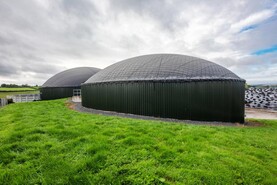Moving Scotland away from direct area payment and towards environmental and productivity payments is the NFUS plan. The union’s future plans for farm support were spelled out at a launch of their “steps to change” document at Holyrood this week.
Once out of the European Common Agricultural Policy (CAP) the Union believes better targeted and more bespoke environmental measures, along with schemes aimed at raising agricultural productivity are the way forward.
During the phasing out of direct payments, farm businesses would be paid a diminishing financial stability payment, based on actively farmed hectares. These payments should not “incentivise inertia”, as the CAP has done, according to the union’s policy and member services director, Jonnie Hall.
Farmers would also get access to non-competitive “productivity and environmental measures” with increasing importance over the years. The third type of payment would be competitive “productivity and environmental measures”.
The centre of the plan is to reward activity, with financial stability support provided to those undertaking activity rather than simply occupying land.
Coupled support is to be an element for future support, but vice president Martin Kennedy stated they “don’t want to go back to a headage system”.
NFUS president Andrew McCornick said: “With one year to go [until Brexit] the clock is ticking, and we’re keen to fill the vacuum. We’re trying to lead on this, as we’ve not seen a significant amount of movement from the [Scottish] Government.”
The union spent Wednesday at Holyrood presenting the proposals to Fergus Ewing, cabinet secretary for rural economy and connectivity, and opposition MSPs.
The document has been drafted following extensive consultation with the union’s 8,500 members and will now undergo further examination and development with members, politicians and wider interested parties, including environmental organisations.
NFUS president Andrew McCornick said: “With one year to go [until Brexit] the clock is ticking, and we’re keen to fill the vacuum. We’re trying to lead on this, as we’ve not seen a significant amount of movement from the [Scottish] Government.”
The union spent Wednesday at Holyrood presenting the proposals to Fergus Ewing, cabinet secretary for rural economy and connectivity, and opposition MSPs.
The document has been drafted following extensive consultation with the union’s 8,500 members and will now undergo further examination and development with members, politicians and wider interested parties, including environmental organisations.
Government support measures for increasing productivity on the farm were suggested. Livestock sector.Data management systems. Electronic identification and data capture equipment. New or refurbished sheds.Health monitoring and disease eradication programmes.Automated systems for milking, feeding, etc.Grassland and forage monitoring systems.Soil health and nutrient management plans.Soil sampling and targeted input use.Slurry and manure storage facilities and spreading equipment for better resource utilisation.
Moving Scotland away from direct area payment and towards environmental and productivity payments is the NFUS plan. The union’s future plans for farm support were spelled out at a launch of their “steps to change” document at Holyrood this week.
Once out of the European Common Agricultural Policy (CAP) the Union believes better targeted and more bespoke environmental measures, along with schemes aimed at raising agricultural productivity are the way forward.
During the phasing out of direct payments, farm businesses would be paid a diminishing financial stability payment, based on actively farmed hectares. These payments should not “incentivise inertia”, as the CAP has done, according to the union’s policy and member services director, Jonnie Hall.
Farmers would also get access to non-competitive “productivity and environmental measures” with increasing importance over the years. The third type of payment would be competitive “productivity and environmental measures”.
The centre of the plan is to reward activity, with financial stability support provided to those undertaking activity rather than simply occupying land.
Coupled support is to be an element for future support, but vice president Martin Kennedy stated they “don’t want to go back to a headage system”.
NFUS president Andrew McCornick said: “With one year to go [until Brexit] the clock is ticking, and we’re keen to fill the vacuum. We’re trying to lead on this, as we’ve not seen a significant amount of movement from the [Scottish] Government.”
The union spent Wednesday at Holyrood presenting the proposals to Fergus Ewing, cabinet secretary for rural economy and connectivity, and opposition MSPs.
The document has been drafted following extensive consultation with the union’s 8,500 members and will now undergo further examination and development with members, politicians and wider interested parties, including environmental organisations.
NFUS president Andrew McCornick said: “With one year to go [until Brexit] the clock is ticking, and we’re keen to fill the vacuum. We’re trying to lead on this, as we’ve not seen a significant amount of movement from the [Scottish] Government.”
The union spent Wednesday at Holyrood presenting the proposals to Fergus Ewing, cabinet secretary for rural economy and connectivity, and opposition MSPs.
The document has been drafted following extensive consultation with the union’s 8,500 members and will now undergo further examination and development with members, politicians and wider interested parties, including environmental organisations.
Government support measures for increasing productivity on the farm were suggested. Livestock sector.Data management systems. Electronic identification and data capture equipment. New or refurbished sheds.Health monitoring and disease eradication programmes.Automated systems for milking, feeding, etc.Grassland and forage monitoring systems.Soil health and nutrient management plans.Soil sampling and targeted input use.Slurry and manure storage facilities and spreading equipment for better resource utilisation. 





 This is a subscriber-only article
This is a subscriber-only article









SHARING OPTIONS: